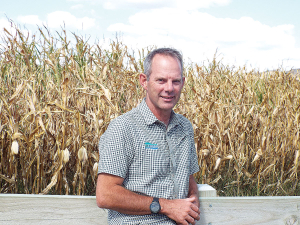Upper North Island Storms: Limited impact on dairy farms
For the most part, dairy farmers in the Waikato, Bay of Plenty, Tairawhiti and the Manawatu appear to have not been too badly affected by recent storms across the upper North Island.
 AgFirst chief executive James Allen says if the drought is bad, there may be a shortage of feed nationwide and it will be hard and costly to buy-in feed.
AgFirst chief executive James Allen says if the drought is bad, there may be a shortage of feed nationwide and it will be hard and costly to buy-in feed.
A warning to dairy farmers: don’t try to buy yourself out of any drought.
That’s the message from AgFirst chief executive and dairy specialist James Allen in light of warnings from Niwa that El Nino conditions could cause a significant drought in many parts of the country. Already there have been signs of the El Nino conditions hitting Hawke’s Bay and Tairawhiti regions with higher-thanaverage temperatures.
Allen told Dairy News that dairying areas most at risk are Northland, the Waikato – especially northern parts of the region – and possibly Bay of Plenty. He says he’s been told by colleagues further south that Manawatū may also get hit by a drought as they have in the past.
“But certainly, the further north you go, the more I get worried,” he says.
He says many regions went into winter with good levels of supplement and says they were needed. He says now one of the key things farmers need to do is to take stock of what they have got left and start building up reserves again.
Allen says the options will vary from region to region and from farm to farm, with some opting for crops while others will focus on producing as much grass silage as they can for the season ahead.
“But equally it’s important to keep the budget in mind as well, especially given the projected lower payout, and farmers need to be clear on what action is profitable and what is not. The dynamics are much different to… two or three years ago. In past drought years, farmers have tended to hold on to poor performing animals longer, but this year getting stock off early will take the pressure off the farm,” he says.
Allen says in this regard it’s important that farmers communicate frequently and well with their processors and book stock in early. He says it’s no longer possible to ring up a company one night and expect the animals to be picked up the next day.
“This doesn’t happen anymore,” he says.
Planning is therefore critical and Allen says it’s often better getting the cull cows off early to reduce the amount of feed that might have to bought in. And on this subject, Allen says that if the drought is bad, there may be a shortage of feed nationwide and it will hard and costly to buy-in feed.
“I certainly wouldn’t be budgeting on sourcing feed from the South Island,” he says.
Allen reiterates that, given the low commodity prices, the prospect of buying oneself out of the drought is fraught.
Voting has started for the renewal of DairyNZ's milksolids levy.
The most successful catchment groups in NZ are those that have 'a source to sea' approach.
Associate Agriculture Minister and Manawatu dairy farmer Andrew Hoggard says the free trade agreement (FTA) negotiated with India is not a bad deal and his party, Act, will support it when it goes before Parliament.
Newly released data from Environment Canterbury (ECan) Farm Environment Plan (FEP) audits are showing a dramatic lift in environmental performance across the region.
A solid recovery of global dairy prices this year makes a $9.50/kgMS milk price almost a shoo-in for this season.
As New Zealand marks the United Nations’ International Year of the Woman Farmer 2026 (IYWF 2026), industry leaders are challenging the misconception that women only support farming.
OPINION: Fonterra may be on the verge of selling its consumer business in New Zealand, but the co-operative is not…
OPINION: What does the birth rate in China have to do with stock trading? Just ask a2 Milk Company.